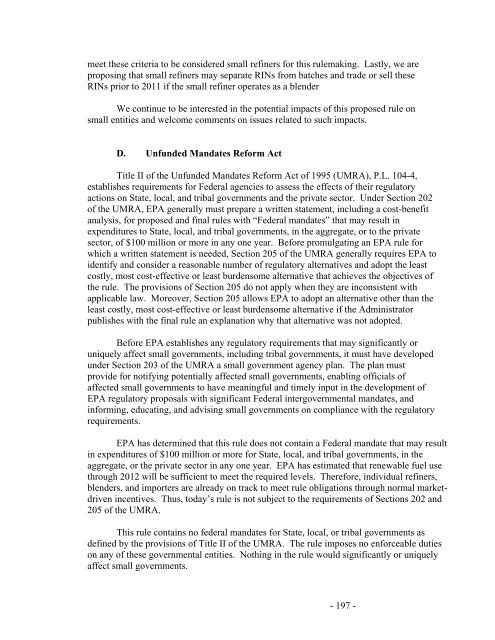Regulation of Fuels and Fuel Additives: Renewable Fuel Standard ...
Regulation of Fuels and Fuel Additives: Renewable Fuel Standard ...
Regulation of Fuels and Fuel Additives: Renewable Fuel Standard ...
You also want an ePaper? Increase the reach of your titles
YUMPU automatically turns print PDFs into web optimized ePapers that Google loves.
meet these criteria to be considered small refiners for this rulemaking. Lastly, we are<br />
proposing that small refiners may separate RINs from batches <strong>and</strong> trade or sell these<br />
RINs prior to 2011 if the small refiner operates as a blender<br />
We continue to be interested in the potential impacts <strong>of</strong> this proposed rule on<br />
small entities <strong>and</strong> welcome comments on issues related to such impacts.<br />
D. Unfunded M<strong>and</strong>ates Reform Act<br />
Title II <strong>of</strong> the Unfunded M<strong>and</strong>ates Reform Act <strong>of</strong> 1995 (UMRA), P.L. 104-4,<br />
establishes requirements for Federal agencies to assess the effects <strong>of</strong> their regulatory<br />
actions on State, local, <strong>and</strong> tribal governments <strong>and</strong> the private sector. Under Section 202<br />
<strong>of</strong> the UMRA, EPA generally must prepare a written statement, including a cost-benefit<br />
analysis, for proposed <strong>and</strong> final rules with “Federal m<strong>and</strong>ates” that may result in<br />
expenditures to State, local, <strong>and</strong> tribal governments, in the aggregate, or to the private<br />
sector, <strong>of</strong> $100 million or more in any one year. Before promulgating an EPA rule for<br />
which a written statement is needed, Section 205 <strong>of</strong> the UMRA generally requires EPA to<br />
identify <strong>and</strong> consider a reasonable number <strong>of</strong> regulatory alternatives <strong>and</strong> adopt the least<br />
costly, most cost-effective or least burdensome alternative that achieves the objectives <strong>of</strong><br />
the rule. The provisions <strong>of</strong> Section 205 do not apply when they are inconsistent with<br />
applicable law. Moreover, Section 205 allows EPA to adopt an alternative other than the<br />
least costly, most cost-effective or least burdensome alternative if the Administrator<br />
publishes with the final rule an explanation why that alternative was not adopted.<br />
Before EPA establishes any regulatory requirements that may significantly or<br />
uniquely affect small governments, including tribal governments, it must have developed<br />
under Section 203 <strong>of</strong> the UMRA a small government agency plan. The plan must<br />
provide for notifying potentially affected small governments, enabling <strong>of</strong>ficials <strong>of</strong><br />
affected small governments to have meaningful <strong>and</strong> timely input in the development <strong>of</strong><br />
EPA regulatory proposals with significant Federal intergovernmental m<strong>and</strong>ates, <strong>and</strong><br />
informing, educating, <strong>and</strong> advising small governments on compliance with the regulatory<br />
requirements.<br />
EPA has determined that this rule does not contain a Federal m<strong>and</strong>ate that may result<br />
in expenditures <strong>of</strong> $100 million or more for State, local, <strong>and</strong> tribal governments, in the<br />
aggregate, or the private sector in any one year. EPA has estimated that renewable fuel use<br />
through 2012 will be sufficient to meet the required levels. Therefore, individual refiners,<br />
blenders, <strong>and</strong> importers are already on track to meet rule obligations through normal marketdriven<br />
incentives. Thus, today’s rule is not subject to the requirements <strong>of</strong> Sections 202 <strong>and</strong><br />
205 <strong>of</strong> the UMRA.<br />
This rule contains no federal m<strong>and</strong>ates for State, local, or tribal governments as<br />
defined by the provisions <strong>of</strong> Title II <strong>of</strong> the UMRA. The rule imposes no enforceable duties<br />
on any <strong>of</strong> these governmental entities. Nothing in the rule would significantly or uniquely<br />
affect small governments.<br />
- 197 -
















